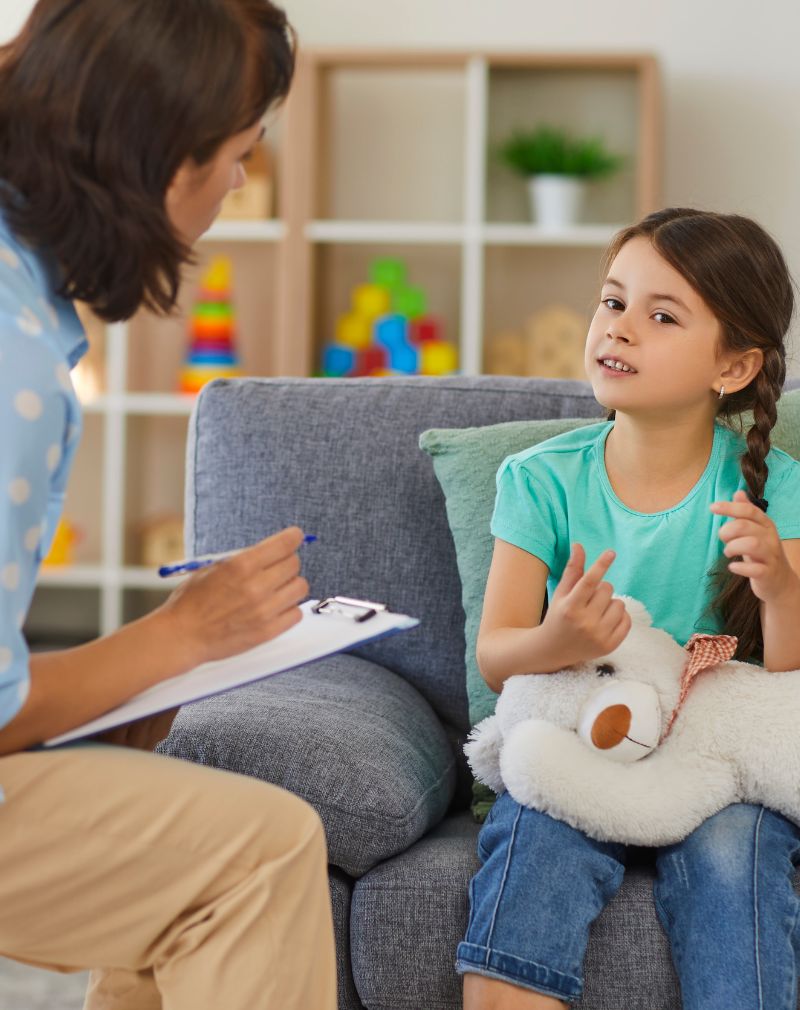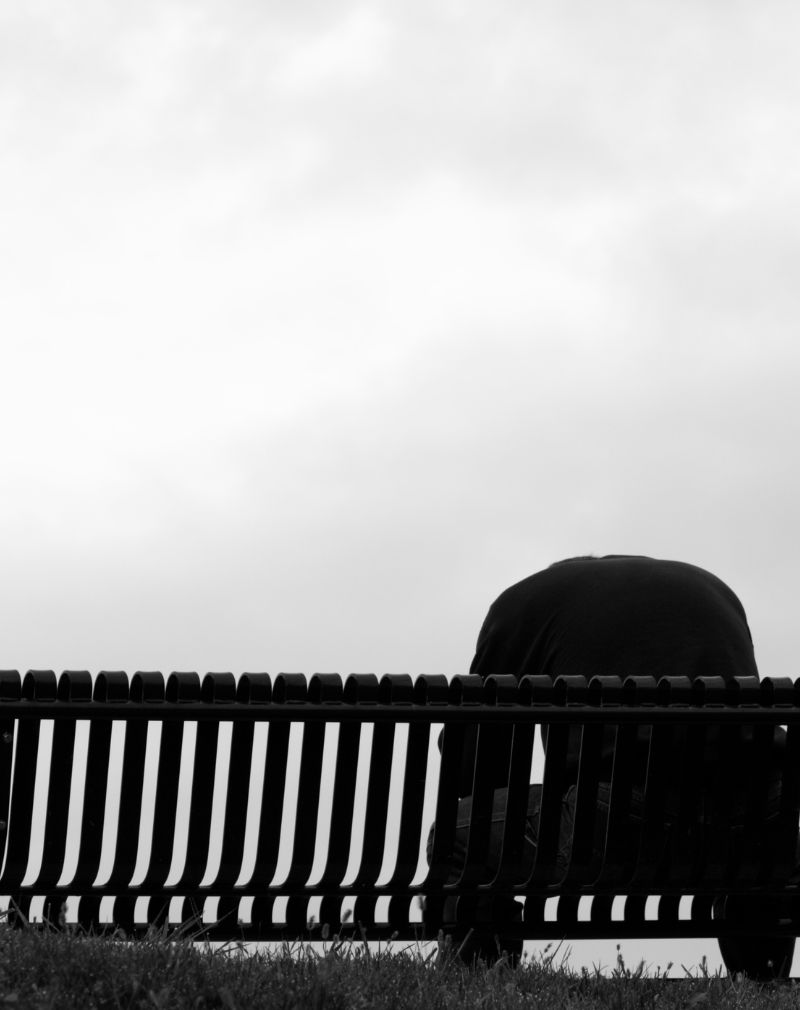ADHD goes far beyond the stereotypes of a child who can’t sit still or pay attention. It’s a complex condition that impacts a child’s internal and external world:
- Behavior: Children with ADHD often struggle with impulsivity, meaning they act without thinking through consequences. They may fidget, interrupt frequently, or have difficulty taking turns. Hyperactivity can make it seem like they’re always “on the go” These behaviors can lead to misunderstandings and frustration in school and social settings.
- Thoughts: A child with ADHD may describe their mind as feeling “busy” or “noisy. ” Racing thoughts, trouble focusing, and difficulty organizing information can lead to feeling overwhelmed and affect their academic performance.
- Feelings Children with ADHD often experience intense emotions that can change quickly. They may struggle with frustration due to challenges with focus or impulsivity. They may feel easily discouraged, leading to low self-esteem. Sensitivity to criticism is also common.
The Importance of Seeking Your Child’s Perspective
Too often, parents and teachers focus on changing the child’s behaviors without truly understanding the underlying struggles and feelings driving them. It is sometimes very important to take the help of therapists and qualified clinicians like the ones at American Wellness Centre in Dubai Healthcare City. Open, honest conversations with your child provide invaluable insights:
- Ask Open-Ended Questions: “Can you tell me what it feels like when you try to do homework?” “What is the hardest thing about having ADHD for you?”
- Actively Listen: Make focused eye contact and put away distractions while your child shares. Reflect back their feelings to ensure you understand (“It sounds like you feel frustrated when…”).
- Validate Their Experience: Let them know that their feelings are normal and understandable, even if you don’t always agree with their actions.
Acknowledging Challenges
Supporting a child with ADHD is incredibly rewarding but also presents unique challenges for parents:
- Frustration and Worry: It’s natural to feel frustrated when your child’s behaviors lead to repeated difficulties. Parents may also worry about their child’s future and the impact ADHD will have.
- Sense of Isolation: It can feel isolating when you don’t understand your child’s struggles, or if others are quick to judge your child’s behavior without understanding ADHD.
- Finding the Right Support: Navigating the world of ADHD diagnoses, interventions, and finding the right therapist or resources can be overwhelming.
Challenges Children with ADHD May Face
Imagine trying to complete a complex puzzle while someone constantly interrupts you, music blares in the background, and the puzzle pieces keep changing colors. This offers a glimpse into the experience of many children with ADHD and highlights some of the core challenges they face:
Focus and Attention: A Mind on the Move
Children with ADHD often have trouble tuning out distractions and filtering information. Their minds may race from thought to thought, and they struggle to sustain focus on a single task, particularly if it seems boring or difficult. This can make following instructions, completing homework, and staying on task incredibly difficult.
Impulsivity and Hyperactivity: Action Before Thought
- Sitting still can feel almost impossible for some children with ADHD, leading to fidgeting, getting out of their seat, and excessive talking.
- They may struggle with waiting their turn in conversations or games, frequently blurting out answers or interrupting others.
- This impulsivity means they often act without thinking about the consequences.
Challenges with Emotional Regulation: Feeling the Feels
Intense and rapidly shifting emotions are common in children with ADHD. Frustration can quickly flare because tasks are harder for them, or they feel misunderstood. They may seem more sensitive to criticism, become discouraged more easily, and have difficulty managing their anger or excitement.
Time Management and Organization: Chaos in Control
Keeping track of belongings, managing time, and remembering deadlines can feel insurmountable for children with ADHD. Backpacks may get lost, homework forgotten, and long-term projects can feel overwhelming due to difficulties breaking down tasks and planning ahead.
It’s important to remember that these challenges vary from child to child. ADHD looks different for everyone, and it’s essential to consider your child’s unique experiences when seeking to understand and support them.
Dr. Cynthia Roukoz’s insightful talk, “My ADHD Brain: What I Wish My Parents Knew,” offers a unique perspective on ADHD by delving into children’s experiences. Her presentation highlights the complexities of ADHD, going beyond the common focus on hyperactivity and impulsivity to emphasize the impact on executive functioning, cognitive control, and inhibition. Dr. Roukoz discusses how early intervention, cognitive-behavioral approaches, and a holistic approach can improve outcomes for children with ADHD. She underscores that understanding a child’s ADHD-related struggles with inhibition can be key to addressing their challenges, potentially reducing the need for extensive therapeutic interventions. Dr Roukoz is a long-time clinician and therapist at American Wellness Centre in Dubai Healthcare City.
What Your Child Wants You to Understand
If your child with ADHD could talk directly to your heart, here are some of the things they might want you to know:
“My brain works differently, and that’s okay.” Children with ADHD need reassurance that they are not “bad” or “lazy.” Their brains are wired differently, which creates unique strengths as well as struggles. Celebrating their differences while also helping them manage challenges is key.
“Sometimes I can’t control my actions, it’s not intentional.” Impulsive outbursts, forgotten chores, or interrupting conversations aren’t always signs of defiance. It’s helpful to understand that a child with ADHD often struggles with self-control, a skill that takes time to develop. Patience and understanding help more than punishment.
“I feel frustrated and misunderstood.” Imagine struggling to do something that seems effortless for others. Children with ADHD often feel frustrated with themselves and misunderstood by parents, teachers, and peers. When you validate their feelings and offer empathy, it helps them feel heard and less alone.
“I’m trying my best.” Many children with ADHD are incredibly hard on themselves. They may feel like they’re always disappointing others. Recognizing their effort, even when they fall short, is incredibly important. Focus on their progress and praise their dedication rather than fixating on the outcome.
By truly listening to your child and trying to see the world from their perspective, you can create a more compassionate and supportive home environment. This open communication and understanding are crucial in helping your child navigate the challenges of ADHD and reach their full potential. It is also crucial you involve a medical professional or a therapist in the mix to ease this journey for your little one, at American Wellness Centre in Dubai Healthcare City, we specialize in helping kids with ADHD ease their way through life.
How Parents Can Help
Understanding your child’s experience is the first step in empowering them to thrive. Here are practical ways you can make a difference:
Build a Strong Foundation
- Create Connection: Strengthen your bond with your child through quality time, one-on-one conversations, and shared activities. When they feel secure and loved, they are more open to your support.
- Open Communication: Let your child know you are there to listen without judgment. Set aside time for regular conversations where they can share their challenges and successes.
Practical Support Strategies
- Structure and Routines: Predictable schedules and routines provide a sense of security and reduce overwhelm. Visual charts and checklists can help children stay on track.
- Focus on Strengths: Actively identify your child’s strengths and talents. What are they interested in? Encourage these passions, building confidence and positive self-esteem.
- Positive Reinforcement: Focus on praising efforts rather than just outcomes. Celebrate small victories and milestones along the way.
- Breaking Down Tasks: Larger tasks can feel insurmountable. Help your child break things down into smaller, more manageable steps.
- Collaboration with School: Communicate openly with your child’s teachers about their ADHD, creating a support plan to optimize their learning experience.
Seek Professional Support
- Exploring Therapies: Specialized therapies like cognitive-behavioral therapy (CBT) can teach children with ADHD valuable skills for managing emotions, improving focus, and developing coping mechanisms. Therapists at the American Wellness Center in Dubai Healthcare City provide expertise in this area.
- Holistic Approach: Consider exploring holistic approaches alongside traditional therapies, such as mindfulness, stress-reduction techniques, and nutritional adjustments.
Supporting a child with ADHD is a journey. Be patient with yourself and your child. Celebrate the good days, learn from the tough ones, and don’t hesitate to seek support when you need it.
By seeking to understand ADHD through your child’s eyes, you gain a greater appreciation for their challenges and the immense effort they put forth every day. Remember, their behaviors are often a reflection of their unique brain wiring, and with your support, they can develop strategies to overcome obstacles.
To parents navigating this journey, know that you are not alone. Challenges are a natural part of the process. By being patient, seeking to understand, and fiercely advocating for your child’s well-being, you are giving them the best possible chance to thrive.
The American Wellness Center in Dubai Healthcare City is here to support families affected by ADHD. Our specialists provide a compassionate and evidence-based approach to help children and adolescents with ADHD build the skills and confidence they need to reach their full potential. Contact us Today!



